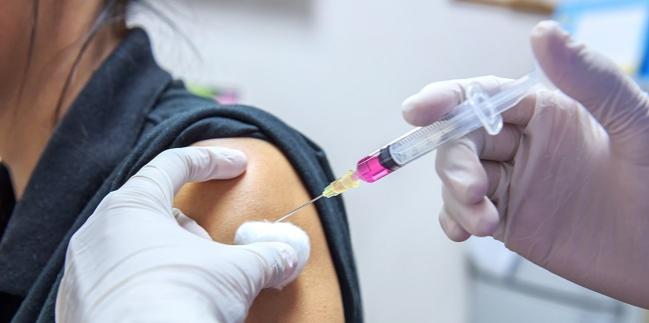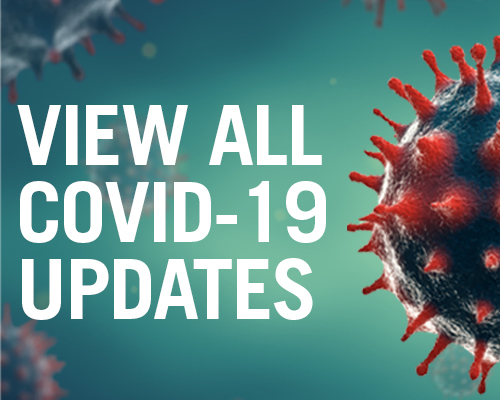Understanding How Flu Viruses Affect the Heart Could Boost COVID-19 Care
A new review discusses shared CV risks, vaccine development, and a plan to redeploy flu trials in the COVID-19 battle.

A state-of-the-art review released today aims to explore the overlaps between influenza and COVID-19, their implications for cardiovascular disease, and strategies for vaccine development.
Viral respiratory infections are known to raise the risk of acute CV events and, despite evidence supporting a flu shot as a means to improve outcomes, many barriers to vaccination still exist. Even at-risk patients often fail to get their shot annually.

SARS-CoV-2, the virus behind the pandemic, arrives on this backdrop. The new review, in part, addresses whether lessons from influenza can be applied to COVID-19 given the many cardiovascular ramifications of the disease and proposes that studies now taking place could be “redeployed” to glean insights into COVID-19.
Already, “several international CV outcome trials are investigating whether seasonal influenza vaccine reduces the risk of cardiovascular events among patients with heart failure or coronary artery disease,” the document’s authors point out. “Existing trial networks may provide an opportunity to assess primary and secondary prevention strategies for patients with CVD at risk of complications from COVID-19.”
Jacob A. Udell, MD, MPH (University of Toronto, Canada), the report’s senior author, told TCTMD that the idea for this review emerged as he and others were wrapping up INVESTED, a US National Institutes of Health-funded RCT of the flu vaccine for cardioprotection. Together, they joined up with researchers from two other randomized trials in this area—IAMI and IVVE—to compile a review specific to influenza.
“As we were doing that, of course, COVID hits,” said Udell. Since then research has moved at “warp speed” to better understand an illness that he described as “on steroids, a super cold virus,” with a wide net of clinical manifestations.
Current COVID-19 vaccine trials are not only enrolling mostly younger adults but also focused mainly on preventing infection, Udell continued. “Yes, of course, breaking the chain of COVID infection would be great. But knowing when we can take the masks off? I think many people are going to want to know whether these vaccines are preventing complicated COVID infections: pneumonia, hospitalization, ventilation, death.”
What’s Known, What’s Not
The review, with Bahar Behrouzi, MSc, and Maria Viviana Araujo Campoverde, BSc (both University of Toronto), as lead authors, attempts to capture this swiftly evolving field. Published online in the Journal of the American College of Cardiology, it starts out with a recap of what’s known about the links between influenza and CVD as well as what’s swiftly being learned about the novel coronavirus, its interaction with cardiovascular risk factors, and its ability to inflict cardiovascular damage.
Influenza viruses, they note, have proinflammatory and prothrombotic effects that increase the risks of acute MI and heart failure. When patients already have CVD, flu infection is more likely to cause fever, tachycardia, potential volume overload, and arrhythmias. That picture has substantial overlap with COVID-19, the authors note. Here, there are also proinflammatory and prothrombotic effects” and the common sequelae are acute MI, myocardial injury, heart failure, disseminated thrombosis, hypotension, arrhythmia, sudden cardiac death, and pediatric inflammatory multisystem syndrome.”
The review also addresses vaccination strategies in both settings, the role of inflammation, and what’s known about the cardioprotective effects of flu shots and what’s currently recommended by health authorities. As the authors note, the World Health Organization, the US Centers for Disease Control and Prevention, and the European Centre for Disease Prevention and Control all have slightly different recommendations, which the document addresses.
Finally, Behrouzi et al summarize the ongoing trials both in the setting of influenza and CVD as well as COVID-19 and efforts to redeploy cardiovascular outcome trials related to influenza to SARS-CoV-2.
Building Better Vaccines
Udell pointed out that as the aforementioned CV outcomes trials wrap up, there will be an existing infrastructure for vaccine research. “We have networks across the world of cardiologists who have been vaccinating people with heart disease for the last few years who are probably in a really good position to test COVID vaccines in high-risks patients, as well,” he said, adding, “No one’s necessarily knocking on our door, and we’re not necessarily looking for business, but we thought, just in case society thinks this is important, we should probably [put this out there].”
Since the 1918 pandemic resulting from the H1N1 virus, vaccines have been made the same way: chicken eggs. “We literally have farms of eggs, like out of a dystopian movie, for . . . harvesting shots,” Udell explained. “They inject the eggs with the antigens of the viruses we think are going to be coming around. We grow these antigens in eggs, and then we harvest these antigens. We mass produce them and clean them and that’s what you end up getting in your arm.”
Now, 100 years later, “it turns out viruses aren’t so dumb,” he said. “We’re seeing that our vaccines are starting to have a waning response against” the H1N1 and H3N2 strains, both of avian origins, as the viruses adapt.
Indeed, over the course of their review, investigators came upon what Udell described as a “dirty little secret” about influenza vaccines—the efficacy of flu shots appears to have the lowest efficacy in the highest-risk patients. During the 2018-2019 flu season, effectiveness in patients 65 and older was approximately 20% against H1N1 and H3N2, the authors note. Those “diminishing returns,” he continued, “have been a little bit disappointing, to be honest. And that data is out there, but I don’t think anyone has really put it together.”
There are various reasons why this might be the case, he suggested. One is that older adults and people with comorbidities don’t have as strong of an immune response to vaccines, lessening their effectiveness. And even if this can be overcome, there’s the question whether an effective vaccine can improve CV outcomes.
“That’s a big concern. We need to fix that,” Udell said. The RNA-based techniques being used for COVID-19 vaccine development, though more expensive than the egg approach, may in turn allow for a mass production of a flu vaccine made the same way, he said, noting that this could be “the one silver lining out of a terrible situation.”
I think many people are going to want to know whether these vaccines are preventing complicated COVID infections: pneumonia, hospitalization, ventilation, death. Jacob A. Udell
Udell advised that, even with the influenza vaccine’s limitations, clinicians should still encourage their patients to get their shot.
“Let us not overthink this,” he said. “We’re disappointed it isn’t like the polio vaccine and it isn’t 100% effective, granted. It’s still better than nothing, so 20% effectiveness of reducing your chances of flu, let alone the translation to a hard outcome of pneumonia or cardiovascular complications or death—I’ll take that,” especially for high-risk individuals.
When it comes to flu shots, “there should be no hesitation on the side of the healthcare professional,” Udell stressed.
Caitlin E. Cox is Executive Editor of TCTMD and Associate Director, Editorial Content at the Cardiovascular Research Foundation. She produces the…
Read Full BioSources
Behrouzi B, Araujo Campoverde MV, Liang K, et al. Influenza vaccination to reduce cardiovascular morbidity and mortality in patients with COVID-19. J Am Coll Cardiol. 2020;76:1777-1794.
Disclosures
- Behrouzi has been supported in part by a University of Toronto MD/PhD studentship award and a Heart & Stroke/Richard Lewar Centre of Excellence in Cardiovascular Research and CANHEART SPOR Graduate Studentship Award.
- Araujo Campoverde has been supported by Secretaría de Educación Superior, Ciencia, Tecnología e Innovación (SENESCYT) 2018 Programa de Becas Internacionales.
- Udell has been supported by a Heart and Stroke Foundation of Canada National New Investigator-Ontario Clinician Scientist Award; an Ontario Ministry of Research, Innovation, and Science Early Researcher Award; as well as by Women’s College Research Institute and the Department of Medicine, Women’s College Hospital. He has received grant support to his institutions from AstraZeneca, Novartis, and Sanofi; has served as a consultant for Amgen, Boehringer Ingelheim, Janssen, Merck, Novartis, and Sanofi; and has received honoraria from Boehringer Ingelheim and Janssen.


Comments